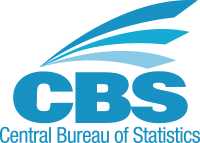Classifications
Classifications are important for statistical analysis. By means of classifications corresponding variables or statistical units can be grouped, thereby facilitating the economic or social statistical analysis.
The Central Bureau of Statistics of Curaçao uses different economic and social classifications. These classifications are based on different international organisations like United Nations, International Labour Organisation etc. These classifications have been designed for compiling, presenting and analysing comparable statistics in individual countries and internationally. Where relevant these classifications have been adapted to the local situation.
Standard International Trade Classification -Rev 3 (SITC)
The SITC is a statistical classification of the commodities designed to provide the commodity aggregates required for purposes of economic analyses and to facilitate the internatinoal comparison of trade-by-commodity data. The SITC (Rev.3) is based on the Harmonized Commodity Description and Coding System (HS), which was created by the Customs Co-opeation Council. Follow this link to the website of United Nations download the SITC classification.
International Standard Industrial Classification (ISIC)
The International Standard Industrial Classification of All Economic Activities (ISIC) is the international reference classification of productive activities. Its main purpose is to provide a set of activity categories that can be utilised for the collection and reporting of statistics according to such activities. It provides a comprehensive framework within which economic data can be collected and reported in a format that is designed for purposes of economic analysis, decision-taking and policy-making. The classification structure represents a standard format to organise detailed information about the state of an economy according to economic principles and perceptions.
These economic activities are subdivided in a hierarchical, four-level structure of mutually exclusive categories, facilitating data collection, presentation and analysis at detailed levels of the economy in an internationally comparable, standardized way. CBS Curaçao has been collecting and reporting on the highest (less detailed) level. This level is referred to as the industrial sectors/industries. You can download the ISIC 4 here
International Standard Classification of Occupations (ISCO)
CBS uses the International Standard Classification of Occupations (ISCO) in labor market statistics in order to classify profession to level. The International Standard Classification of Occupations (ISCO) is one of the main international classifications for which ILO is responsible. ISCO is a tool for organizing jobs into a clearly defined set of groups according to the tasks and duties undertaken in the job. Its main aim are to provide: a basis for the international reporting, comparison and exchange of statistical and administrative data about occupations. Follow this link to the website of International Labour Organization to download the International Standard Classification of Occupations (ISCO)
International Standard Classification of Education (ISCED)
Op Curaçao is sinds 1 januari 2020 overeenstemming bereikt over de indelingen van huidige onderwijsniveaus met de daarbij behorende internationale codes (ISCED 2011) International Standard Classification of Education , dit is in nauw overleg met het Ministerie van Onderwijs Wetenschap Cultuur en Sport (OWCS) vastgelegd.
Deze overeenstemming maakt het mogelijk om op het eiland cijfers te vergelijken, maar zeker ook om vergelijkingen met de (ei)landen om ons heen en binnen het Koninkrijk der Nederlanden mogelijk te maken.
Binnen het CBS werd tot en met 2019 gewerkt met het ISCED 1997 systeem waarin opleidingen werden ingedeeld in niveau en richting. Er werden 7 ISCED niveau’s onderscheiden, waarbij de indeling gericht was op de volgorde waarin de onderwijsprogramma’s konden worden gevolgd. Het onderwijscodeboek wat hierbij gebruikt werd, werd deels herzien, naar aanleiding van de onderwijsvernieuwingen die plaats hebben gevonden tussen 1998 en 2010.
De actualisatie naar het ISCED 2011 niveau en ISCED F 2013 richting heeft door financiële omstandigheden op zich laten wachten, maar is in 2020 afgerond. ISCED 2011 kent 10 niveaus (01.02 1tm 8.) (korte uitleg). ISCED F 2013 kan worden opgedeeld in hoofd-, sub, detail en rubriek groep (richting).
De richtingen zoals omschreven in ISCED F 2013 en de ISCED 2011 niveaus, zijn in een nieuw codeboek opgenomen.
ISCED F 2013 is op studierichting opgenomen in het codeboek, deze valt binnen een bepaalde rubriekcode. De detail, sub en hoofdgroepen kunnen hier door de eerste cijfers uit worden afgeleid. Een richting kan op verschillende niveaus worden gevolgd.
Classification of Individual Consumption by Purpose (COICOP)
The Classification of individual consumption by purpose, abbreviated as COICOP, is a classification developed by the United Nations Statistics Division to classify and analyse individual consumption expenditures incurred by households, non-profit institutions serving households and general government according to their purpose. It includes categories such as clothing and footwear, housing, water, electricity, and gas and other fuels (Wikipedia). For more information please click on this link COICOP.
